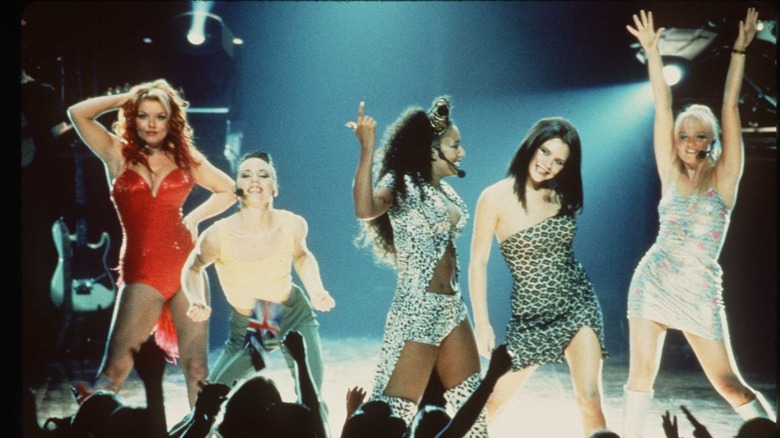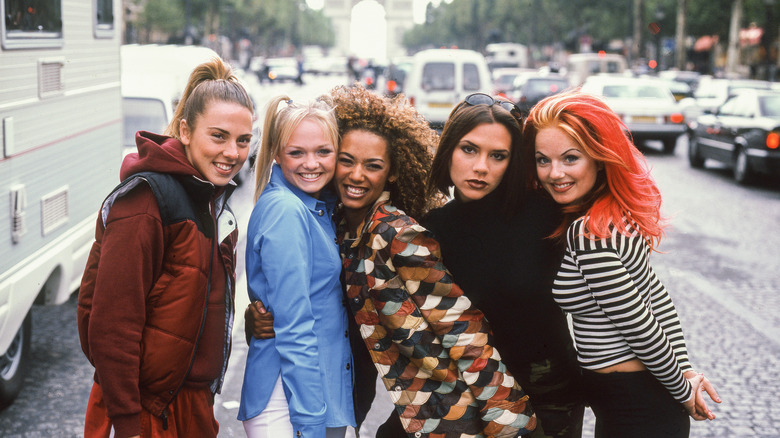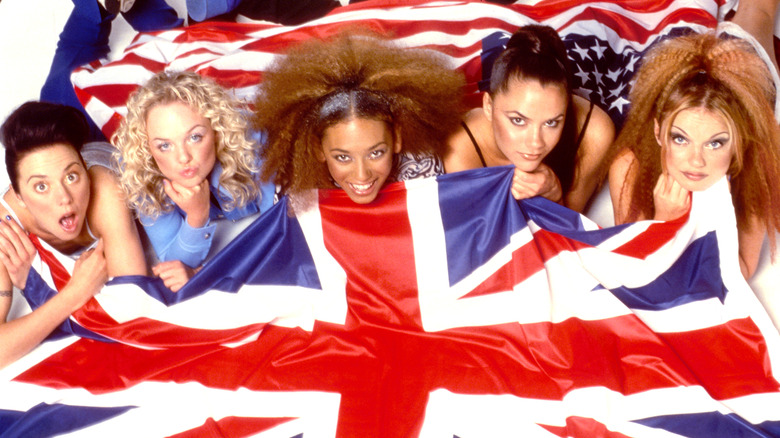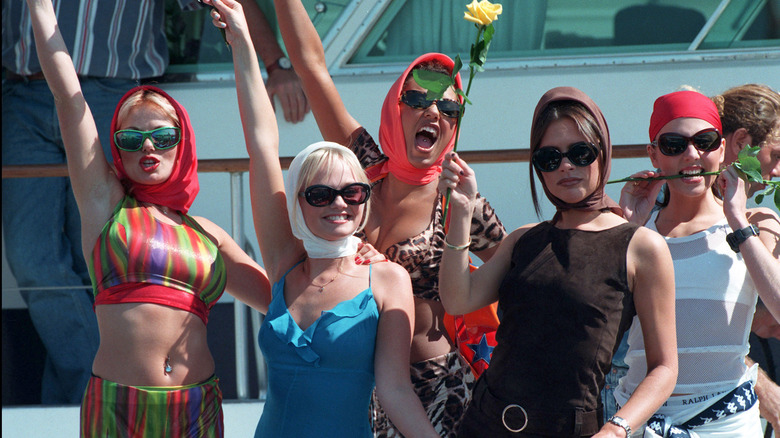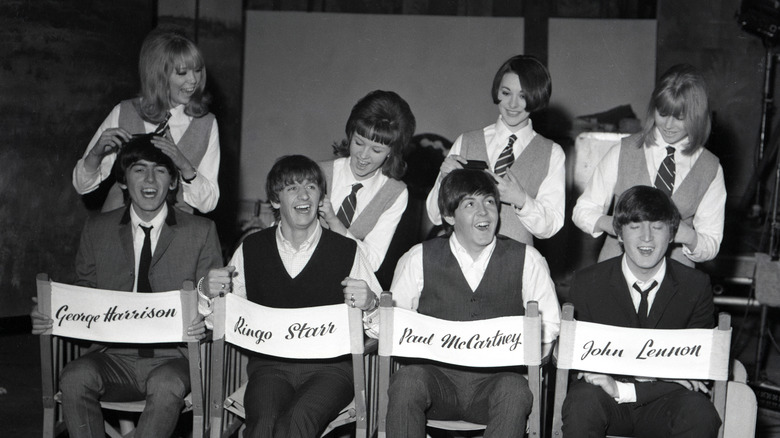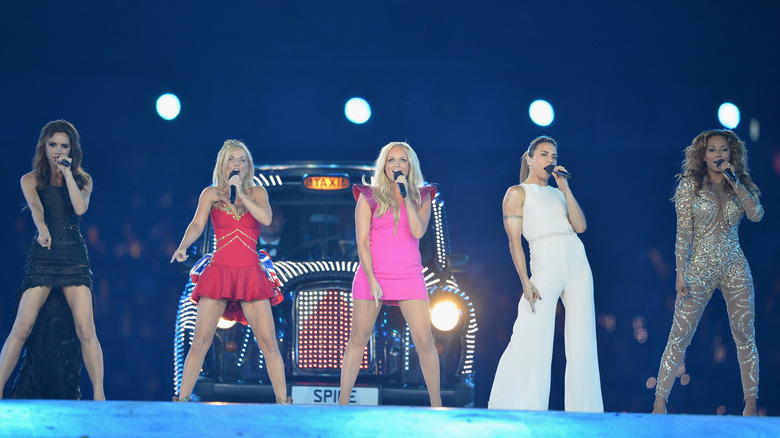25 Years Of Spice World And The Peak Of '90s Girl Power
"Spice World" debuted 25 years ago, signalling the absolute zenith of the Spice Girls' celebrity and the phenomenon of Girl Power.
They've got fire in their eyes, hunger in their bellies, and great big shoes on their feet. For any girl who grew up in the '90s, there was one quintet of sassy, stomping women who embodied the era more thoroughly than anyone else. The Spice Girls weren't just a pop band: they were a genuine phenomenon. They sold millions of records and defined a kind of fierce young feminism that seemed tailor-made for the turn of the millennium. While their star burned briefly, it was bright and continues to cast a shadow over 25 years later. For some of us, Ginger, Scary, Posh, Sporty, and Baby Spice symbolized a brand of endless possibility and feminine force that felt like someone had blown the doors off the entire decade. And for one film, they were movie-stars.
How the Spice Girls came to be
The Spice Girls were formed in 1994 when talent managers Bob and Chris Herbert decided to find a girl group that could compete with the omnipresent boy bands of the decade. The plan was to find five very different women who could appeal to young girls. They held open auditions and around 400 women attended for a chance to be in the band. Eventually, after some chopping and changing, they were left with five finalists: Victoria Adams, Melanie Brown, Emma Bunton, Melanie Chisholm, and Geri Halliwell.
By the following year, the group had parted from the management that created them and set to work finding new representation. Some demo tapes eventually found their way to Simon Fuller, who signed them to his management, 19 Entertainment, in May 1995. The buzz around the band grew, and after a heated bidding war, Virgin Records signed them to a five-album deal only two months later. It took another year for them to release their debut single, "Wannabe," but by then, their success seemed guaranteed. CDs flew off the shelves, and it seemed as though everyone was in the thrall of Girl Power. Only months later, the Girls appeared at the Cannes Film Festival to announce their first film, "Spice World." Yes, it really happened that quickly.
How Spice World was made
"Spice World" was an unapologetic rush job that finished filming in the Summer of 1997 in time for a Super Bowl weekend release in America (it premiered on Boxing Day 1997 in the Spice homeland of the UK). Yet, it's a curiously ambitious one. Initially, the Spice Girls management were approached by Disney to make a movie but they turned down that offer for fear that the story would be too sappy and sanitized. The Spice Girls themselves weren't exactly raunchy or dangerous but they certainly weren't a cutesy Disney-esque brand. Instead, Fuller's sister Kim decided to write the screenplay. The band members would play heightened versions of themselves, preparing for the biggest gig of their careers while juggling a pregnant BFF, stage fright, exhausting touring schedules, and an alien invasion.
Bob Spiers, a British director best known for his work on TV comedies like "French and Saunders" and "A Bit of Fry and Laurie," signed on after comedian Jennifer Saunders told him to, even though he had no idea who the band were (making him a rare exception at the time.) Eventually, the script was updated multiple times to make room for an array of guest stars, including Roger Moore, Elvis Costello, Bob Hoskins, Elton John, Bob Geldof, and George Wendt. The plan was to make something that was every bit as cool as the band, a starry-eyed, cameo-laden representation of that hyper-specific moment in time and celebrity. In 1997, Tony Blair was elected Prime Minister of the UK, and the idea of "Cool Britannia" dominated the country. It was the return of Swinging London of the '60s but with a more chaotic edge: Britpop bands, the Oasis vs. Blur rivalry, the art of Damien Hirst, Richard Curtis rom-coms, radical theater by the likes of Sarah Kane and Martin McDonagh, lads mags, Austin Powers, club music, and Union Jacks. This was Britain for the youths, full of attitude but a strong patriotic edge. It's no coincidence that one of the most striking images of this period was Geri Halliwell performing in a Union Jack mini-dress.
Spice World is a weird movie
When "Spice World" premiered, the reviews were dreadful. Siskel and Ebert declared it to be "the worst film of the year" a mere three weeks into 1998. Roger Ebert wrote in his half-star review that the women themselves were "so detached they can't even successfully lip-synch their own songs." All five women won Razzies for Worst Actress. None of that stopped the movie from grossing over $100 million from a $25 million budget. By that point in time, the Spice Girls were untouchable. That bubble would soon burst when Halliwell abruptly left the band in May 1998.
Modern critics have offered a kinder reappraisal of "Spice World" than it earned upon release. It really is a fascinating amalgamation of ideas, a blend of earnest creativity and corporate shamelessness. It's a meta reimagining of the Spice Girls' origins with a sly glance towards the cruelty of the music industry. The main motivation for the band is dealing with a crammed schedule that allows them no time to be alone or be anything other than a Spice Girl. Those rigid brands the women marketed themselves by — the fashion one, the sporty one, the baby one — are the subject of most of the jokes, but also a reminder of how much it sucks to be commodified for the masses. Producers try to package them for movies and merchandise, men try to push them around, and view their young fans as disposable. Their hapless manager, played by a very game Richard E. Grant, takes orders from a cat-stroking Bond villain-esque boss (fittingly played by Roger Moore.) It's all played with utmost irreverence but any former tween girl who loved the Spice Girls can revisit "Spice World" and find something more substantial than pop bangers and platform shoes.
Spice World and the pop band movie trend
"Spice World" obviously wasn't the first film based on a band. The Beatles' "A Hard Day's Night" is a genuinely great film (that the world of Spice borrowed from heavily) and accurately captured the mania of the band at its cute boyband peak. The success of Richard Lester's movie inspired a slew of wannabes, usually made on a small budget and churned out in record time before the acts in question fell out of trend. Gerry and the Pacemakers starred in "Ferry Cross the Mersey" in 1965, while the Dave Clark Five's "Catch Us If You Can," released the same year, was helmed by a pre-"Deliverance" John Boorman.
In the '90s, Simon Fuller tried to recreate Spice magic with the band S Club 7, launching them simultaneously via their music and a cutesy Monkees-esque series of TV shows like "Miami 7." A movie, "S Club: Seeing Double," soon followed, but the band never broke out in America. He would again enlist his sister Kim to write "From Justin to Kelly," a rom-com designed for Kelly Clarkson and Justin Guarini, the winner and runner-up of the first season of "American Idol." That would later become known as one of the worst films ever made. The death of that movie may have killed the entire trend. Nowadays, if a band or singer explodes in popularity, especially with young people, they're more likely to be the subject of a documentary than the star of a semi-fictional feature. It can be made more quickly, has a sheen of respectability, and offers a bigger promise of relatability from its subject to its audience. That and you don't have to worry about whether or not, say, the One Direction boys can actually act.
How girl power dominated the late '90s
The Spice Girls broke up in 2000, after suffering sales slumps when Halliwell left the band. Yet their impact remained, as well as their popularity. They reunited for a world tour in 2007, which earned them over $100 million. They reunited again in 2019, albeit without Victoria, and performed in the closing ceremony of the 2012 London Olympic Games. There was an unsuccessful West End musical, a slew of merchandising, and more drag queen tributes than you can shake your crimped pigtails at. To this day, they are still the best-selling girl group of all time.
The burst of magic that was "Spice World" embodied a unique moment in music and celebrity that arguably influenced the world of entertainment more than the songs (most of which are still absolute bangers.) A slew of girl bands followed in their wake, as the industry realized how much it was worth their while to actually market to girls and young women. Everyone from Adele to Billie Eilish to Beyoncé has cited the Spice Girls as an inspiration. But it was Girl Power that made them special. It may have been thinly defined and applied in questionable ways, such as well Geri claimed that Margaret Thatcher had girl power, but to kids, it meant everything. It was our first exposure to female solidarity, to confidence and friendship that had little interest in making boys happy or putting yourself second to others. Sure, it was a marketing gimmick, a relatively apolitical one that felt lightweight compared to other musicians' activism (compare Girl Power to TLC's stridently political campaigning for safe sex and AIDS awareness in their songs.) Still, it kicked open a door that let a hell of a lot of women walk through. "Spice World" was for us, so the fact that it has withstood the test of time is a testament to the eternal force of Girl Power, whatever you want that to be.
